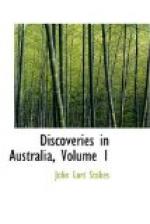ROE’S GROUP.
This group we called after Lieutenant Roe, R.N., Surveyor-General of Western Australia, who had accompanied Captain King in that perilous voyage, and whose valuable information had enabled us to escape so many of the dangers to which our predecessors had been exposed.
Nothing could exceed the desolate appearance of the land near which we were now lying: rocks, of a primitive character, massed together in all the variety of an irregularity, that rather reminded the beholder of Nature’s ruin than her grandeur, rose, drear and desolate, above the surrounding waters; no trees shaded their riven sides, but the water-loving mangrove clothed the base of this sterile island, and a coarse, wiry grass was thinly spread over its sides.
MIAGO AND HIS FRIENDS.
Soon after we had anchored, some natives were observed by Miago watching us from the shore; and shortly afterwards a party landed, to attempt communicating with them, and to get the necessary observations for the survey. In the first object they failed altogether; for these blackfellows, as that gallant hero called them, retired to the heights, and, while closely watching every movement, refused to trust themselves within our reach. The smallness of their number, and their want of arms, quite elevated the courage of Miago, who loudly vaunted his intention of monopolizing a northern gin, in order to astonish his friends upon our return to the south: stealing away the ladies being, as I have before remarked, the crowning and most honourable achievement of which man, in the eyes of these savages, is capable. I ought not to omit remarking here, that the natives seen to-day were accompanied by a black dog; the only instance in which, before or since, we observed the existence of a dog of that colour in this vast country. Captain King mentions that he saw one in this neighbourhood during his visit in 1821.
DAY OF REST.
The following day was Sunday, and, there being no absolute necessity to shift our berth, we remained at anchor; marking the character of this sacred festival, by giving it up to the crew, for healthful rest and harmless recreation—after morning prayers had been performed—as much as the needful discipline, upon a proper observance of which the efficiency of a ship’s company entirely depends, would allow. This practice, constantly observed throughout our long voyage, was always attended with the best results.
Some rather small pigeons,* of a dark brown colour, marked with a white patch on the wings, were seen, and some specimens shot. They made a whirring sound in flight, like the partridge, and appeared to haunt the rocks; a habit which all subsequent observation confirmed.
(Footnote. Petrophila albipennis. Gould.)
February 12.
Soon after daylight we left this anchorage, whose exact position I mention, as it may be of use to some future voyager in these seas. The eastern of the three islands north of Roe’s group was just open of the north point of the bight in which we lay, and a small rocky islet close to the shore bore South-South-West one mile; we had five fathoms at low-water in the bight, and twelve immediately outside.




